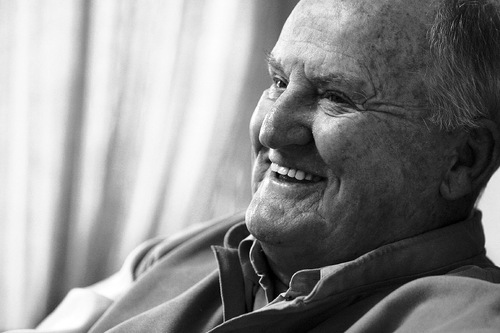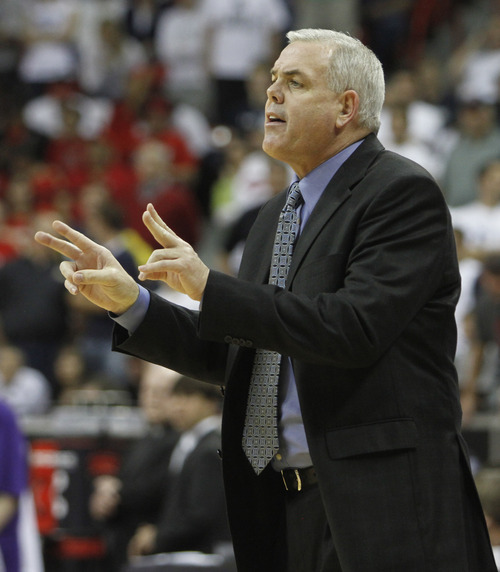This is an archived article that was published on sltrib.com in 2011, and information in the article may be outdated. It is provided only for personal research purposes and may not be reprinted.
Provo • Legendary BYU football coach LaVell Edwards, as forthright and accommodating as anyone, will politely answer questions about the school's athletic program nonstop. Current BYU athletic director Tom Holmoe will discuss for hours the school's move to football independence, Jimmer Fredette's incredible basketball season or the new television deal with ESPN.
But when questions come up regarding how much the private school owned and operated by The Church of Jesus Christ of Latter-day Saints pays its coaches, and whether that pay is close to what similar schools across the country pay their coaches, the answers get short and choppy from both men.
"That's a very personal thing," Edwards said. "The university is what it is. If you are a coach and the pay scale here is one of your [main] concerns, then maybe it isn't right [for you] … I really don't have any comment further, except to say [BYU's salary structure] is different, no question."
Said Holmoe: "We do things very uniquely around here. We don't necessarily look at national numbers to pay our coaches. … We have a pay system here that has been in place for a long time. It doesn't go backwards. … If they are successful, they are going to get paid well."
Unlike most schools in college athletics, BYU does not have to provide salary information to the public because it is a private institution. The bottom line is that precious few people know exactly how much football coach Bronco Mendenhall makes after signing a three-year contract extension in January, or how much men's basketball coach Dave Rose receives from the five-year deal he agreed to in March.
And they aren't telling.
"I am absolutely, 100 percent satisfied," Mendenhall said. "I have been treated more than fairly."
Some figures available
While government records access rules don't apply to BYU, all schools are annually required to provide the U.S. Department of Education with coaching salary information as part of the Equity in Athletics Disclosure Act. BYU doesn't have to release specific coaches' salaries, but is compelled to provide average salaries of head coaches of its men's and women's teams, as well as average salaries of its assistant coaches.
The figures generally show BYU does not lag behind other schools as much as many believe.
The most recent figures, from the 2009-10 school year, illustrate how BYU paid its 10 men's team head coaches an average of $209,542 and its nine women's team head coaches an average of $109,423. It paid its 23 men's team assistant coaches an average of $102,492 and its 18 women's team assistant coaches an average of $58,560 a year. Of course, the pay raises that Mendenhall and Rose recently received — called "hefty" by a former high-ranking BYU athletic department official — did not factor into those figures.
By way of comparison, rival Utah paid its seven men's team head coaches an average of $170,000 more last year, but paid its 11 women's team head coaches about $29,000 less. The Utes pay their 18 men's team assistants about $8,000 more per year than BYU does, but pay their 19 women's team assistants more than $14,000 less.
The same source that said Mendenhall and Rose received hefty raises said that the long-standing belief that BYU drastically underpays its coaches was "probably true" a decade ago, but is no longer the case.
"I don't think moving to the West Coast Conference changes things that much," Holmoe said. "I think that as coaches have success with their teams, we like to provide bonuses for them. We have a bonus structure in place for our Olympic sports coaches now. The guys and gals that have been successful, we reward them for their success."
Loyalty to church?
Several years ago, BYU booster Sy Kimball helped form the "Coaches Circle" as an arm of the Cougar Club with the specific purpose of setting up a $5 million endowment to be used to supplement the pay of BYU coaches who are succeeding in order to keep them at BYU, or attract others to the school. The plan seems to be working, as BYU was able to keep Rose recently when other programs were expressing interest.
Former BYU football player and current ESPN college football analyst Trevor Matich said that for some BYU coaches, the opportunity to work at the church-owned university offsets working for pay that is often perceived to be less than market value.
"I think LaVell set an example as a way to go about it," Matich said. "At a time when coaches were always looking for an opportunity to get a bigger paycheck, LaVell turned down opportunities to go to the NFL and bigger colleges for more money. Looking back, he can look at his legacy, his lifestyle and the way he is revered in this community. He's happy. Looks like he made a great choice."
Then there's the case of BYU's Heisman Trophy-winning quarterback, Ty Detmer. Now a high school coach in Texas, Detmer says he would entertain the idea of coaching at BYU "if they came to me and said, 'We want you, and we need you,' that type of thing."
However, he said the compensation package would definitely be a factor.
"You hear the [talk] that, well, maybe they will want to coach there because it is BYU, and it is in Utah, and it is the LDS Church's school," he said. "You hear that people here are fine making less. … But you start looking and obviously with the [football coaching staff] changes that have been made, the job security that maybe was there with LaVell, maybe it is not what it once was."
Detmer said he has no direct knowledge regarding what BYU coaches are paid but said the school won't be competitive as a football independent if it neglects paying market value.
"In my opinion, if we are going to be a top program, if we are going to be independent and make a run at the BCS every year, we are going to have to step up to the table like some of these other schools are in order to keep the good, young coaches that we have," he said. "We have some young guys on the staff now that have head-coaching potential. That's what every coach wants, is a guy that is hungry, that is going to put the hours in and work. But in order to keep them, you are going to have to pay them at some point, too."
Twitter: @drewjay —
Average head coaching pay at selected NCAA schools
School Men's Women's
BYU $209,542 $109,423
Utah $389,516 $80,250
Utah State $189,667 $51,356
Notre Dame $208,424 $155,404
SDSU $318,864 $122,652
Stanford $391,853 $167,334
Gonzaga $160,093 $61,775
Source: U.S. Department of Education figures via Equity in Athletics Disclosure Act





